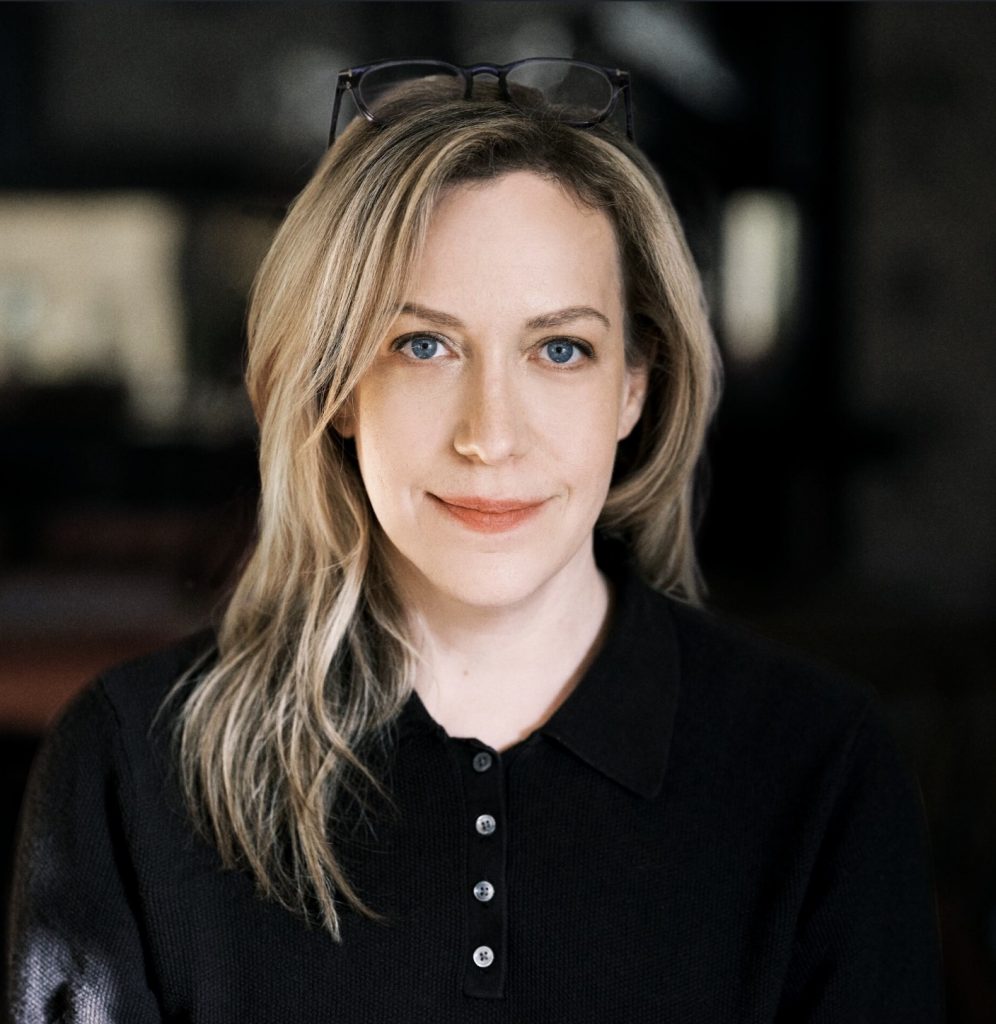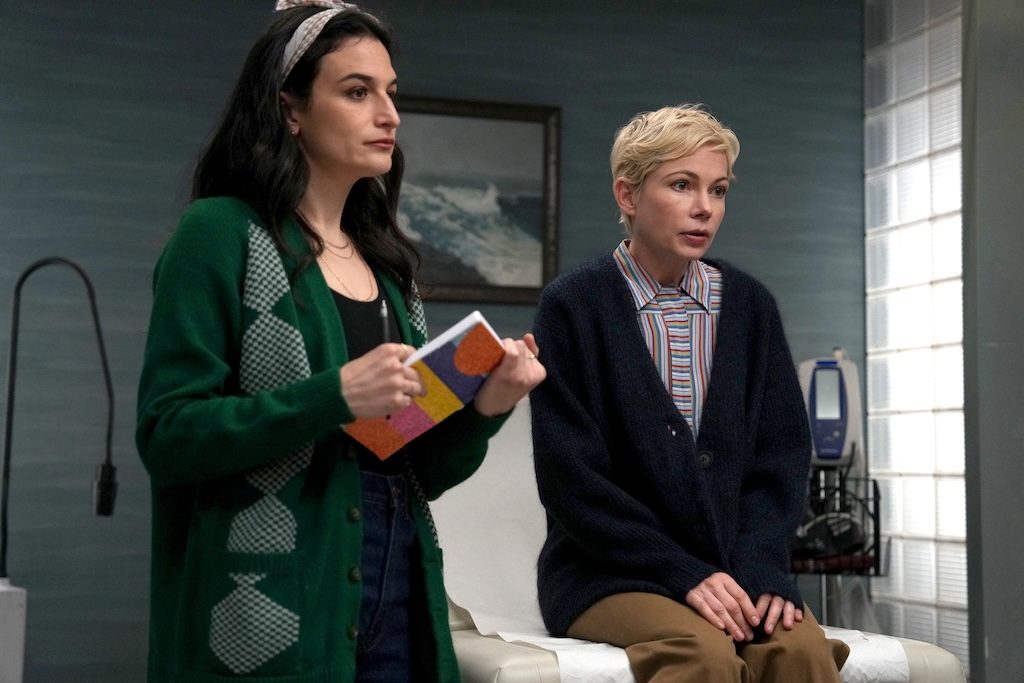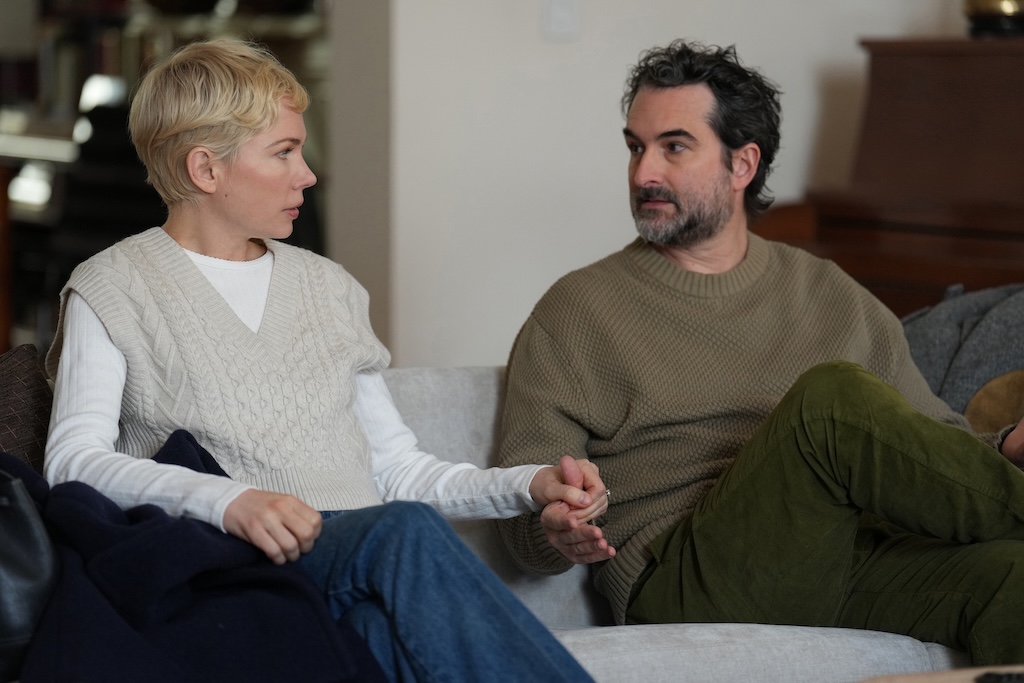“I was famously saying in my mind, this is gonna be so easy. It’s a three-act structure. It’s very clear what the story is,” recalls co-showrunner Elizabeth Meriwether who created, showran, and executive produced the show with Kim Rosenstock. “We could make this really fast.” She laughs, reflecting on her initial optimism. “And now here we are five years later, and it was not a quick process.”
Meriwether is describing her experience adapting the hit podcast Dying for Sex alongside longtime collaborator Kim Rosenstock. The Hulu series, starring Michelle Williams and Jenny Slate, chronicles a woman’s sexual awakening following a terminal cancer diagnosis.
The creative partnership between Meriwether and Rosenstock stretches back to their early twenties in New York, where they both interned at Playwrights Horizons. “Kim had an internship, I had the same internship the next year, and she sort of trained me,” Meriwether explains.

Elizabeth Meriwether
Their professional relationship deepened when Meriwether hired Rosenstock for the FOX sitcom New Girl, a show Meriwether created.
Finding the Story Behind the Podcast
The inspiration for Dying for Sex came in early 2020, just as COVID lockdowns were beginning. Meriwether had just finished working on The Dropout and approached Rosenstock about collaborating on a new project based on a podcast she’d recently discovered.
“Kim was like, ‘Are you gonna make me listen to this podcast about a woman who’s dying in the middle of a pretty bad outbreak out there?'” Meriwether recalls with a laugh. “But then Kim listened to it, and loved it.”
[More: Elizabeth Meriwether Describes ‘The Dropout’]
The source material follows the real-life story of Molly, a woman with metastatic cancer who embarks on a series of sexual adventures while recording frank conversations with her best friend Nikki. What begins as lighthearted banter gradually reveals deeper traumas, including Molly’s history of childhood sexual abuse.
“It’s this small story about one woman and her health journey, but by the end of the podcast, it feels like it’s about literally everything,” Meriwether explains. “It’s about all of life, and that’s what drew me to it really – just how big it felt, but also such a small specific story.”
Adapting Raw Reality for Television
The writing partners faced several significant challenges in adaptation. “Our challenge early on was just how do we take a podcast that’s an incredibly engaging conversation between two women about events that have already happened and make it into a show where we’re watching the things happen in real time,” says Rosenstock.
They also made a crucial structural change. “In the podcast, she’s experiencing all of these brief sexual encounters with all these different men, but towards the very end, she says she’s open to love for the first time. She wants to actually connect with somebody, and then she dies before she gets a chance to.”

Kim Rosenstock. Photo by Jason Rothenberg
“We decided in the show to kind of give her the gift of being able to follow through with that,” she continues, referring to the character played by Rob Delaney who becomes Molly’s love interest. “We decided to build towards this connection.”
Another key decision was addressing Molly’s childhood trauma upfront rather than building toward it as a revelation. “We didn’t want the show to be building towards the reveal of the childhood trauma. We wanted to put that at the top and just make it a fact of her life and watch her deal with it.”
Finding Humor in Darkness
Maintaining a consistent tone proved particularly challenging. “The podcast has one tone when it starts, and then it takes sort of a big turn. We wanted the show to feel somehow funny the whole way through, but still also feel really honest and real.”
“Part of the balancing act was how to make it emotional and funny at the same time, and almost have those two things constantly be feeding off of each other. It’s funnier because it’s so emotional, and it’s so emotional because it’s funny.”
This delicate balance required careful casting decisions. “We got so lucky with Jenny Slate and Michelle Williams because they’re both so great at finding emotion in comedy and comedy in emotion. They both have that ability, and not every actor does.”
A New Approach to Sex Scenes
“At one moment in the podcast, she says sex is an antidote to death,” Meriwether continues. “For her, it was her way of asserting her humanity in the face of death and in the face of illness.”
This understanding informed how they approached the show’s numerous intimate scenes.
“Every sex scene that’s in the show is there for a reason, for an emotional reason for the character. We approached the sex scenes with the same story sense that we approached scenes with dialogue.”
The writers took their responsibility seriously, attending a WGA seminar on writing sex scenes. “Your responsibility as the screenwriter is to be very specific about what is happening in the scene,” Meriwether explains.

Nikki (Jenny Slate) & Molly (Michelle Williams) Photo by Sarah Shatz/ FX
“To clinically and clearly write out what is actually happening. For all of the writing I do about sex, I’m actually so embarrassed by it,” she admits. “But in the long run, it’s so much better to do that because it gets everybody on the same page.” The production employed intimacy coordinators – sometimes multiple ones for complex scenes.
“We had a team of intimacy coordinators on microphones,” Meriwether recalls of a particularly involved sex party sequence. Far from limiting creativity, she found the structure liberating. Rosenstock adds, “It’s like you’re making the boundaries beforehand and then you’re letting them go inside of those boundaries. Everyone, just like in a good BDSM scene, has consented to the terms,” she jokes.
Embracing the Fear
When asked for advice for aspiring writers, Meriwether offers wisdom that reflects her approach to Dying for Sex – a project that pushed her into uncomfortable territory. “You don’t get past the fear, you embrace it,” she says thoughtfully.
“What fear does for me is make me hyper-aware of everything. It makes me come alive. I try to just follow my reactions to things, really listen to my reactions,” she continues. “If I’m listening to a podcast or reading a book, and I think, ‘How would this actually work? How could I even do this?’ I listen to that and try to think there’s a reason I’m having that reaction.”
“When you get into that comfort zone in Hollywood, I feel like people love to have you do projects that you’ve done before because they feel like that’s a safe bet. When you’re ready, lean into the thing that’s scaring you. That’s probably where the best stuff is inside of you. It’s getting to the core of the story – the thing that needs to be told.”

